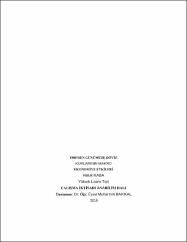| dc.contributor.author | Kaba, Haluk | |
| dc.date.accessioned | 2020-01-07T12:28:14Z | |
| dc.date.available | 2020-01-07T12:28:14Z | |
| dc.date.issued | 2019 | |
| dc.identifier.uri | https://hdl.handle.net/20.500.11776/3394 | |
| dc.description.abstract | Dünyadaki ekonomilerde, hem reel piyasalarda hem finansal piyasalarda etkin olan globalleşmenin, hükümetlerin uyguladıkları ekonomi ve siyasi politikalara da etkisi çoktur. Tez de, ülkelerin uyguladıkları döviz kuru sistemleri ile makroekonomik ilişkiler soruşturulmaktadır. Ülkemizde cumhuriyet tarihi boyunca, birbirinden farklı döviz kuru sistemleri uygulanarak, kur düzenlemeleri aracılığıyla, dış ödemeler bilançosu dengesi ve makroekonomik denge sağlanmaya çalışılmıştır. Bu durum, uygulanan döviz kuru politikalarının yalnız başına bozulan makroekonomik dengenin yeniden sağlanmasında yeterli olmadığını göstermektedir. Bilimsel analizlerde ortaya çıkan sonuçlar, döviz kuru politikalarının makroekonomik dengeyi yeniden sağlamada çokta istenilen bir şekilde hedef bir politika olarak seçilemeyeceğini gösterir niteliktedir. piyasa ekonomilerine geçişin hızla yükseldiği günümüzde optimum kur rejiminin nasıl olması gerektiği üzerinde çalışılırken, dış ticarette açıklık veya fazlalık, sermaye hareketlerinin serbestisinin var olup olmadığı, döviz rezervlerinin yapısı gibi bir çok faktörü hesaplamak gerekmektedir. | en_US |
| dc.description.abstract | The effects of globalization, which is effective both in the economies of the world and in the real markets and in the financial markets, on the economic and political policies implemented by the governments are many. The thesis investigates the macroeconomic relations with the exchange rate systems applied by the countries. Throughout the history of the Republic, foreign exchange rates have been applied to ensure foreign exchange balance balance and macroeconomic balance through exchange rate arrangements. This shows that the applied exchange rate policies alone are not sufficient to restore the macroeconomic balance. The results of the scientific analysis show that exchange rate policies cannot be chosen as a target policy in a way that is desired in order to restore macroeconomic balance. as the transition to market economies is rapidly increasing, it is necessary to calculate many factors, such as openness or surplus in foreign trade, the freedom of capital movements, and the structure of foreign currency reserves, while working on how the optimal exchange rate regime should be. | en_US |
| dc.language.iso | tur | en_US |
| dc.publisher | Namık Kemal Üniversitesi | en_US |
| dc.rights | info:eu-repo/semantics/embargoedAccess | en_US |
| dc.subject | Döviz Kuru | en_US |
| dc.subject | Döviz Kuru Rejimleri | en_US |
| dc.subject | Enflasyon | en_US |
| dc.subject | Makro Ekonomi | en_US |
| dc.subject | Para Politikası | en_US |
| dc.subject | Exchange Rate | en_US |
| dc.subject | Exchange Rate Regimes | en_US |
| dc.subject | Inflation | en_US |
| dc.subject | macroeconomics | en_US |
| dc.subject | Monetary Policy | en_US |
| dc.title | 1980’ den günümüze döviz kurlarının makro ekonomiye etkileri | en_US |
| dc.title.alternative | Effects Of Exchange Rates on Macroeconomics From 1980 To Today | en_US |
| dc.type | masterThesis | en_US |
| dc.department | Enstitüler, Sosyal Bilimler Enstitüsü, Çalışma İktisadı Ana Bilim Dalı | en_US |
| dc.relation.publicationcategory | Tez | en_US |



















